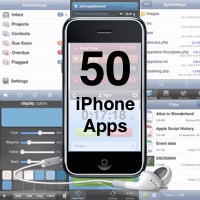Apple Attracts Increasingly More Application Development
In 2009 besides recording three of the most profitable quarters in company history and ending the year with $36 billion in the bank, Apple had its biggest iPhone opening weekend ever this summer.

And most of this happened without Chief Executive Steve Jobs. Last year's questions over his physical appearance were answered when he announced in late January he'd be taking a leave of absence to deal with a medical problem that he found out was "more complex" than a hormone imbalance. Jobs declined to be more specific about his condition, which led to discussion of how much of executives' private lives we should be privy to. By late spring it was revealed he underwent liver transplant surgery. Chief Operations Officer Tim Cook handled the reins for six months. By July, Jobs was seen back on the Cupertino campus. His first public appearance came a short time later at Apple's September iPod event.
Like most years, 2009 was punctuated by a series of signature Apple product launch events, though this time the majority were simple refreshes of hardware. In software, Apple saw the release of the latest iteration of its operating system, Mac OS X 10.6, a refreshed iTunes 9, and an updated iPhone OS--now with copy/paste and multimedia messaging. And as has been true for each of the past two years, the release of the iPhone 3GS was a spectacle in itself, CNET News reports.
Meanwhile, the iFund has invested in seven companies, including Gogii, out of more than 3,000 business plans that were pitched. Murphy estimates there are about 50,000 iPhone application developers.
"It's much easier now to sort through the mass of companies as it's much more obvious now what's working and what's not, based on 100,000 apps in the App Store," Murphy said.
About 70% of developers have made only a single app, while 25% are preexisting companies extending their brand to the iPhone, he said.
"The iPhone set off a Big Bang moment for the mobile Internet like Netscape did for the Internet a decade ago," he said.
The Netscape Navigator browser, which debuted in 1994, was instrumental in the Web's transformation from a niche tool into a global phenomenon, The Los Angeles Times reports.
It was also reported, the App Store, which recently passed the 100,000 application milestone and is according to most projections headed for at least 200,000 in 2010, has been a runaway success for Apple, as much cultural institution by now as business triumph.
But it's also been a boon for companies like Tapulous, which has 20 employees and, according to Reuters, is pulling down $1 million in sales a month -- all by creating and selling applications for iPhone and iPod Touch. Apple's cut of that loot, by the way, is 30 percent based on the 70/30 iPhone Developer Program terms.
Granted, companies like Tapulous are the exception, not the rule. But they aren't alone, either. Gogii, for example, has seen huge success with the application TextPlus, which according to The Los Angeles Times has been downloaded more than 2.3 million times since its June 2009 debut. Gogii's success, in fact, has led more than one observer to declare a new wave of tech giants is emerging around the application development ecosystem.
The Android Market, although dwarfed by Apple's App Store, is itself growing at rapid clip, having recently hit the 20,000 apps mark. Its offerings are expected to more than double by the end of next year. And Apple, for its part, is attracting increasingly more varied and interesting types of application development: from United Healthcare's recently debuted doctor-finder DocGPS app, to Raytheon's motion tracker and positioning apps for soldiers in on-the-ground mission scenarios, ChannelWeb reports.
Subscribe to Pravda.Ru Telegram channel, Facebook, RSS!





